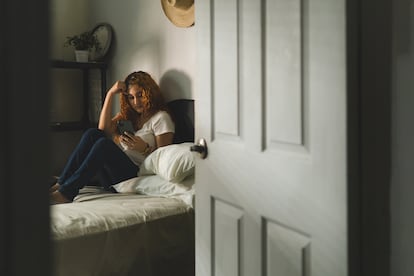Apps to treat depression reduce the severity of the illness, according to a study
Experts recognize the usefulness of treatment via cell phone applications, but only as a complement to traditional therapy with psychiatrists or psychologists


Using cellular devices and technology has spread to all areas of life, and mental health has not been left out. Just as there are applications that help control diseases such as hypertension and diabetes, there are those that help deal with depression and its symptoms. A meta-analysis published in the journal JAMA Network Open has found “significant reductions in severity” in patients with the illness who had used 16 of the apps. The researchers, from the University of Seoul (South Korea), believe that these apps can lead to an improvement in the treatment of depressive disorder.
The functions of these applications are to use a test to evaluate the patient’s mood and send them guidelines and messages to help them improve their symptoms, such as negativity, apathy, or demotivation, says Luis Gutiérrez, who is a member of the Spanish Psychiatry and Mental Health Society (SEPSM). In addition, some apps also have tools that allow remote consultations with the therapist, adds Carme Carrión, a principal researcher with the eHealth Lab group at the Open University of Catalonia (UOC).
The authors state that applications such as these offer more freedom, with respect to time and the patient moving around. However, they also advocate the need to further develop and refine these cellular device-based treatments, to “adapt them to socially disadvantaged populations.”
3.8% of the world’s population (about 280 million people) suffer from depression, according to the World Health Organization (WHO). In low- and middle-income countries, more than 75% receive no treatment at all, despite numerous effective therapies. The authors of the study attribute this fact to the high cost of therapies, fear of being stigmatized and lack of awareness about the effectiveness of the treatment, among others.
The interventions that were analyzed lasted between three and 24 weeks and included both people who were receiving treatment and those who were not. After the study, the authors of the work concluded that, for cell phone depression treatment to be as effective as possible, it should not be prolonged for more than eight weeks. In addition, this also reduced the patient’s “financial and psychological burdens,” the text adds. They also observed that severity was reduced more in those who were not following any other treatment for depression. Gutiérrez believes that more time is needed, “at least nine months or a year, to see the patient fully recover.”
It is easy to notice improvement in depressive symptoms in eight weeks if a person has moderate to severe depression, says the psychiatrist. “If I am very depressed, the symptoms will immediately improve with whatever little I do,” adds Gutiérrez. Although what is truly interesting for him would be to follow patients long-term, “to prevent relapses and ensure that the initial improvement is maintained over time.”
They are not worth replacing psychologists
Carme Carrión and Luis Gutiérrez state that these types of applications can never replace therapists. The app provides value, but what is really important is “how the therapeutic process is designed and this tool is included so that it is effective,” adds Carrión. Gutiérrez highlights its capacity as a complement when the patient does not see his or her psychiatrist or psychologist: “These applications can give you, on a daily basis, a guideline or a recommendation.”
Miguel Ángel López, clinical psychologist at the Jaén hospital and member of the steering committee of the Spanish Society of Clinical and Health Psychology (SEPCyS), explains that the therapeutic approach for depression is multidisciplinary and personalized for each patient. The specialist doubts the effectiveness of apps to cure depression, as research from the University of Seoul says, and believes that the idea that depression can be “addressed and cured by entering an application” can be confusing and frustrating for patients.
This research is an analysis of 13 studies that evaluated 16 apps and a total of 1,470 participants between 20 and 40 years old. Gutiérrez (from the SEPSM) and López (from the SEPCyS) agree that the sample is too small and homogeneous to be able to generalize the results to the entire population, something that the authors also recognize in the text itself. A UOC study published last September in JMR Publications, in which Carrión participated, concluded that hybrid interventions that combined the use of these applications and traditional therapy were more effective. According to its authors, this modality can be more economical for the patient and expand therapists’ ability to treat more people.
Trust an app for therapy
The UOC researcher considers that an appropriate mobile application to treat depression must be based on scientific evidence, have health professionals behind its development, and specify very well everything concerned with the use of patient data. Furthermore, it would be interesting if there was an app that could be integrated with the information network of the public health system. Thus, the data would be transferred directly to the patient’s medical history, Carrión emphasizes.
Not only do these types of applications exist for the treatment of depression, but there are also some for bipolar disorder and schizophrenia, Gutiérrez says. One way to distinguish between effective and ineffective applications is to find out if it has the hallmark of a health institution. For example, in Spain, the Andalusian Health Quality Agency has the healthy app seal and Catalonia has AppSalut, a catalog with accredited and safe applications for use in therapy. In the U.S., the American Psychological Association (APA) has developed a model to evaluate them at five levels, taking into account issues such as data processing, user-friendliness, or whether there are clinical trials that prove their effectiveness.
Studies like this make it clear that the transformation of the health system does not just involve having more people working. Everything must be more efficient, and that includes the use of these tools, which accompany people in real time between visits to their therapist, according to Carmen Carrión. The UOC researcher emphasizes the importance of investing in mental health: “We are not only talking about many new people in the health system, but we are talking about tools that can help these people,” she concludes.
Sign up for our weekly newsletter to get more English-language news coverage from EL PAÍS USA Edition
Tu suscripción se está usando en otro dispositivo
¿Quieres añadir otro usuario a tu suscripción?
Si continúas leyendo en este dispositivo, no se podrá leer en el otro.
FlechaTu suscripción se está usando en otro dispositivo y solo puedes acceder a EL PAÍS desde un dispositivo a la vez.
Si quieres compartir tu cuenta, cambia tu suscripción a la modalidad Premium, así podrás añadir otro usuario. Cada uno accederá con su propia cuenta de email, lo que os permitirá personalizar vuestra experiencia en EL PAÍS.
¿Tienes una suscripción de empresa? Accede aquí para contratar más cuentas.
En el caso de no saber quién está usando tu cuenta, te recomendamos cambiar tu contraseña aquí.
Si decides continuar compartiendo tu cuenta, este mensaje se mostrará en tu dispositivo y en el de la otra persona que está usando tu cuenta de forma indefinida, afectando a tu experiencia de lectura. Puedes consultar aquí los términos y condiciones de la suscripción digital.








































